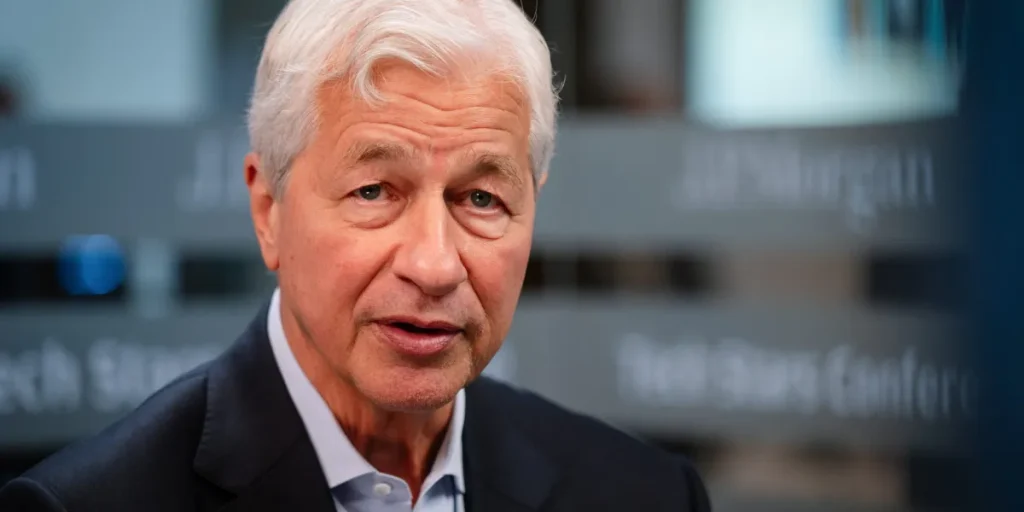“It will eliminate jobs,” Dimon said, pointing out that so did tractors and cars, once upon a time. “It happens too fast,” he said, referring to sudden, disruptive technological change. He urged society, government and business to “figure out how we can save jobs,” whether that’s retraining, a new form of income, early retirement, he said there’s a need for “something. You can’t just take all these people and throw them on the street … making $30,000 a year when they were making ($150,000), you’ll have a revolution.”
He insisted that the breakthrough is genuine and worth taking seriously. “AI itself is real,” he declared, making clear that he sees the underlying technology as both transformative and enduring. “You should be using it,” he said, speaking to any business that was listening. But he added a caveat, saying that back in 1996, “the internet was real” and “You could look at the whole thing like it was a bubble.” Then he broke down the real difference that he sees: between AI, on the one hand, and generative AI, on the other. It’s an important distinction, Dimon said, while adding that “some asset prices are high, in some form of bubble territory.”
Bubble or not
Dimon compared today’s AI exuberance to the early days of the internet, calling that “in total, a payoff,” as Google, YouTube and Meta eventually emerged and proved durable. He said he was somewhat cautious about conditions in the current market, yet he urged people not to simply label all of AI as a speculative frenzy. “You can’t look at AI as a bubble, though some of these things may be in the bubble. In total, it’ll probably pay off.” He said some projects won’t be done the way they were announced, other will get the power they need, but he declined to discuss them in particular, urging a case-by-case evaluation of investments. Just days earlier, Dimon had warned in a BBC interview that he saw 30% chances of a correction in the stock market, calling himself “far more worried than others.”
Under Dimon’s leadership, JPMorgan has invested billions in artificial intelligence and machine learning since 2012, with more than 2,000 staff now dedicated to AI and hundreds of applications in production. He has cited tangible benefits worth upwards of $2 billion in cost savings or new revenue streams. Dimon described AI as being seamlessly embedded in JPMorgan’s operations, from fraud prevention to customer service and the analysis of complex legal documents.
The CEO made a crucial distinction, saying that his bank has applied AI to “very specific things” such as risk and fraud and marketing, and he’s seen that it works. He argued that AI adoption is sometimes hard to distinguish from pure procedural improvement, likening it to going into a new workstream “and all of a sudden your headcount’s down 40%.”
But Dimon put generative AI, which is famously prone to hallucination, in “the other category.” He said this is largely anecdotal in terms of efficiencies, with some people arguing it saves them hours. “What’s that worth? Did you just spend two hours doing something else? We don’t really know.” Responding to the influential MIT study that found 95% of generative AI pilots had failed to yield return on investment, Dimon said he thinks it’s a mistake to try to calculate everything so carefully in terms of efficiencies: “We spend a lot of money getting data into the proper format, so it’ll be used by AI. We’re just doing it. We’re not measuring how much it costs.” Getting the data right is imperative, he argued, and then efficiencies will follow. Dimon added that he calls friends at other companies, other CEOs, and most AI adoption stories “actually work,” acknowledging that some are maybe disappointed, too.
The master class
For Dimon, agility and humility are paramount in this era of rapid change. “Use it. Get good at it. Make it part of your tool set, your weapon set, and you’ll learn. It’ll get better all the time,” he advised fellow executives to make ongoing investments in training and adaptation. JPMorgan has even begun sending managers to AI “master classes” to deepen their skills and broaden organizational expertise.
As the global AI investment boom continues to lift markets—accounting for an estimated 40% of U.S. GDP growth in 2025—Dimon’s voice stands out for its candor and caution. Ever the pragmatist, he called for thoughtful regulation, robust safety nets, and deliberate planning to mitigate AI’s impacts and harness its opportunities. For policy and corporate leaders alike, Dimon’s message is unmistakable: the AI era is here, and the worst response is denial or delay.
